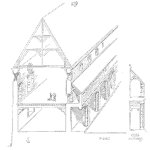
Let’s say you run across a lightweight, inexpensive, easy to manufacture metal that you are considering for a new bike frame. Beyond the functional considerations of strength, size, and finish options what else do you consider?
Is it durable? If it fails how does it fail (a shattering a bicycle frame would not be good, for example). You may also consider how the bicycle will be used and stored. What stress will the frame experience over its lifetime? [Read more…]














 Ask a question or send along a comment.
Please login to view and use the contact form.
Ask a question or send along a comment.
Please login to view and use the contact form.